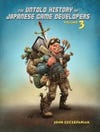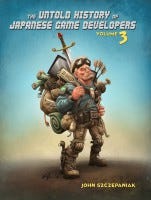Q&A on EYE: Divine Cybermancy with Streum-On-Studio
A brief chat about the team's unusual cyberpunk FPS

I initiated this interview with Streum-on-Studio for a collaborative article on EYE: Divine Cybermancy, a rather unusual but enjoyable FPS available through Steam. Getting any answers back was taking a while and the collaboration dissolved, so I decided to pitch it to another website, for an article on the return of cyberpunk in video games. We've had the Syndicate reboot, two new Shadowrun projects, Remember Me, plus a game actually called "Cyberpunk". There's probably a couple I'm forgetting. Unfortunately the answers took so long to arrive that article pitch was sidelined, and when the answers finally did arrive they weren't as detailed as I had hoped. Not that I can criticise the team, since they're a small indie studio and were busy producing a free content add-on for the game. They're also French, so there was the language barrier to contend with too.
Regardless, here are the answers. Although a little bit short, I can't think of any other interview with Streum-On-Studio. If there's been a detailed interview in print or on a website, please post a link. To flesh these out (and give some context if you've not played the game) there's some commentary from myself on various aspects; the original questions are in bold, while the answers are italicised. I have not edited the answers - they are as I received them.
Let's grab our cyberdecks and jack in, shall we?

--- --- --- --- ---
While the game is ostensibly an FPS, it's heavy with RPG gubbins. Far more than something like the original Deus Ex. It's also the antithesis of the streamlined and easy-to-understand designs most studios strive for today; the RPG mechanics are obtuse, and working them out is in itself a meta-game. It's also massive and obscenely open-ended, meaning you will get lost. You've got XP and a variety of stats, skills, weapons, equipment, magic powers, and research levels for everything. Dying results in reincarnation and a permanent stat penalty. Everything is facilitated through XP and currency. But little is explained, so you work it out as you go. It borrows elements from the original Syndicate, Shadowrun series (p&p and video game adaptations), System Shock games, Deus Ex, STALKER, and plenty else. However, the foundation of EYE:DC is based on a private board game the studio developed...

1) Please tell me about your role-playing board game "AVA" from 1998. Was it made publicly available? Do you have photos of it being played?
SoS: The role-playing board game has been held internally in the company and it is currently in perpetual evolution. I don’t think it will be sold in the future.
---
Not only was EYE based on a board game, but it's spiritual successor/ pseudo-follow up to an old Half Life mod set in the same universe.
2) After AVA you made the Half Life mod, Syndicate Black Ops. Is it safe to say that by the time you started EYE:DC you had spent many years refining the mechanics and underlying systems?
SoS: You’re right; Syndicate Black Ops has been used as a prototype to test what would be E.Y.E then.
---
3) How many staff worked on EYE:DC? How long was development? With so many complex systems, was it difficult to test the game?
SoS: The development of E.Y.E really began in 2008 and ended 3 years later. Around a dozen of developers have worked on it. It has been really hard to test it internally, so that is why it was so buggy at the release.
---
Not only is the game fascinating from a purely mechanical gameplay perspective, but its story, setting and atmosphere are notable. Computer screens for example have cascading walls of what appears to be Chinese text. It's reminiscent of a lot of cyberpunk fiction, which blends in Asian symbolism. In the Shadowrun world for example, there's the Japanese mega-corporations. I was especially fascinated by the use of Chinese instead of Japanese text though, since it reminded me of the TV series Firefly, and Joss Whedon saying something about how in the future everyone will speak only English and Chinese, since today these represent the biggest superpowers.

4) I love the unique story and the setting of the world. It's full of interesting little details, such as computer screens using Chinese text. Do you feel that Chinese will be the dominant written language in the future?
SoS: We chose the Chinese, because it is greatly more visual and designed than other languages. We prefer not pronounce ourselves about the dominance of this language in the future :p
---
Getting back to the mechanics, I wanted to satisfy my OCD side and dedicate an entire question just to the realistic reloading in the game. Hit reload and any unused bullets still in the gun are lost. It's always disturbed me somewhat, for example, when playing a game like Call of Juarez Bound in Blood, and firing a single bullet in a six-shooter while having 6/6 bullets remaining. The animation shows the avatar disposing of the single spent bullet's shell and five unused bullets, all falling to the ground, putting six fresh bullets in, and yet my ammo count now says 6/5. In the middle of a firefight did my character really sort through and save those five unused bullets? What about with a machinegun - how do bullets in ejected casings magically find their way back into my inventory? The realism of EYE is enhanced by the fact that not only do you lose unused bullets during reloading, but each reloading item takes up the finite space in your inventory. There's a razor thin balancing game going on between rationing ammunition because of scarcity, and wasting it in order to free up space for special items.
5) Almost all FPS today feature unrealistic weapon reloading: if you press reload the bullets are just filled up as if by magic. EYE:DC uses "realistic reloading", so all bullets still left in the weapon are lost when you reload. How big a decision was this?
SoS: We didn’t imagine making it in a different way; we are fans of tactical and realistic FPS such as Vietcong or the Swat series. Moreover this system makes the players to be more involved in the importance to do a good management of his shots and reloads. It also adds more tension to the game.
---

Surprisingly for a PC based FPS, there is no quick saving. Technically there's no dying either, since you have a "resuscitation device" implanted in your body. Dying however causes permanent stat damage. Researching a complex web of medical enhancements can correct this, but players accustomed to quick saving could still find themselves reduced to an unwinnable state.
6) A lot of people on the internet complained there wasn't a "quick save" option. It adds a sense of urgency to your actions. Was the team under a lot of pressure regarding player demands - were you tempted to add quick save?
SoS: No, we never thought to this option. We believe the role from the developers is not necessarily to please the player, nor to simplify the games. Doing that might drive to what is more and more frequent: a standardization of the market. And in E.Y.E it is essential for the dramatic tension to let the player assume his own choices.
---

7) What happened to a few of the weapons that didn't make it from Syndicate Black Ops? One of the earliest trailers for EYE:DC showed a rifle or SMG that's never seen in game. Was anything else cut from the game before release?
SoS: There are a lot of things, weapons, NPC and chapters that have been deleted in the final version. It is simply because they don’t make sense or they unbalance too much the gameplay. On this point we are working like Valve.
---
When I say ambiguous in this question, I mean there really isn't a true ending. Finishing the game three times, siding with each of the in-game factions, allows you to start the game a 4th time and pass beyond a magical wall in the game's opening section. You end up in a strange area where... nothing seems to happen.
8) The ending is controversial. There are three main story paths for the player to align with, but the true ending is rather ambiguous... Do you want to comment on it, or the theories that players have?
SoS: We have to admit the abruptness and not really fineness of the ending. We didn’t have the courage to bring a definitive and significant ending. We would prefer the player interpretation to be the most important. And almost we didn’t want to end this story ourselves. It’s a bit like in the movie Donnie Darko.
---

9) In hindsight, is there anything the team wished they had done differently? Is there more you would have liked to add or improve on in EYE:DC, but weren't able due to time and resources?
SoS: Actually, there are a lot of things. But if we need to keep only the two most important, it would be the interfaces (they are quite dull in solo / coop) and almost all the dialogues. We would also love to have had much care for the English version and to have released the game in more languages. We have learnt a lot from our mistakes in E.Y.E, so we hope our next projects will be better.
---
10) What does Streum-on Studios have planned for the future? Do you intend to expand upon EYE:DC or go in a completely different direction?
SoS: At this time, we want to make a break with E.Y.E to launch into a new way. Then I think we’ll come back to this universe, when we’ll have the needed step back to make a second worthy of the name opus.
--- --- ---

Given that the Gamasutra blogs are intended for discussion among designers about game design, it seems out of place for me - as a writer - to offer judgement on EYE:DC as a game. We're not here for reviews, are we?
I will say that the sheer strangeness of EYE:DC, its refusal to adhere to many of the current common tropes of FPS design, made it seem extremely fresh for me. Which is perhaps contradictory to the fact that it liberally borrows from just about every cyberpunk game before it, not to mention numerous films (one entire level is basically Aliens the movie, with one NPC named Dutch after Arnold's character in Predator). In many ways EYE reminded me of Immercenary, which I'd covered on Gamasutra before.
Regardless, you have to admit that as a small indie group Streum-on-Studio do what they want as they want to. I hope that in the future another writer, possibly a double native French/English speaker, interviews them and really gets to the heart of their work.

Read more about:
BlogsAbout the Author
You May Also Like









